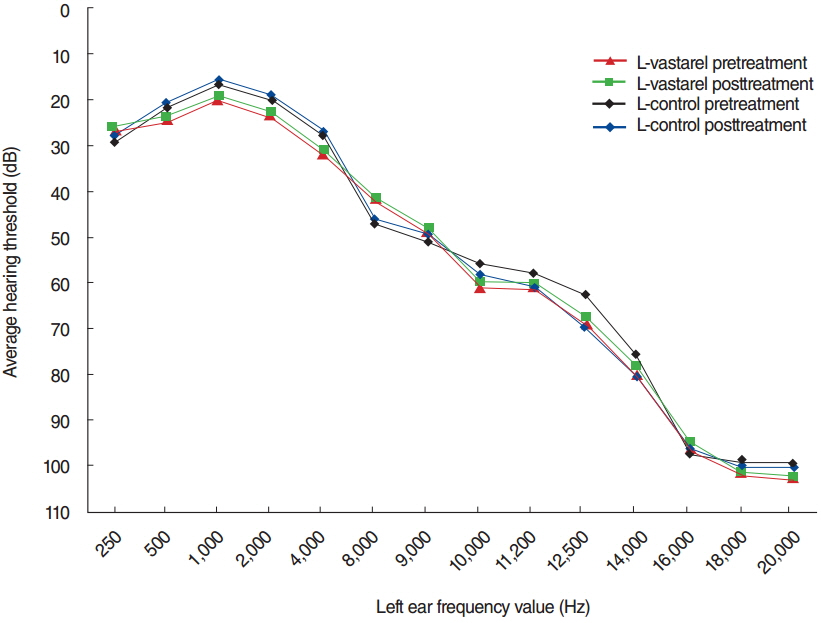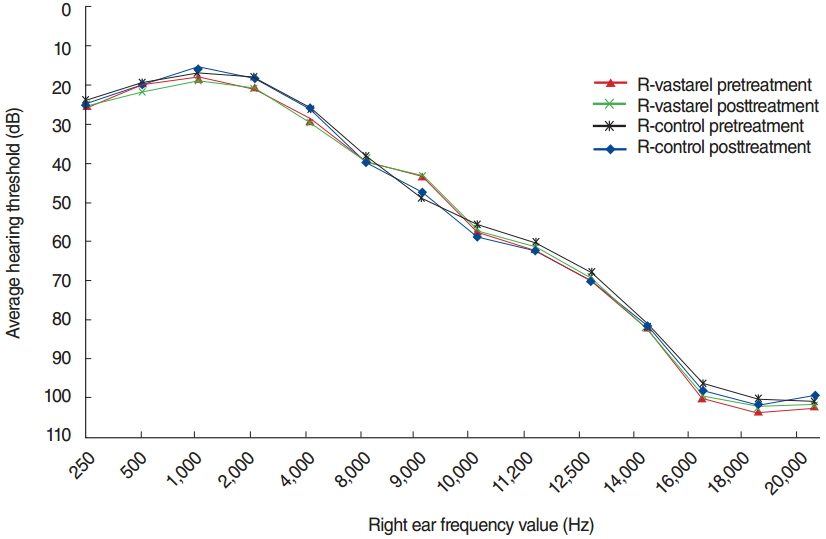Clin Exp Otorhinolaryngol.
2016 Sep;9(3):192-197. 10.21053/ceo.2015.00619.
Efficacy of Trimetazidine Dihydrochloride for Relieving Chronic Tinnitus: A Randomized Double-Blind Study
- Affiliations
-
- 1Department of Otorhinolaryngology-Head and Neck Surgery, Okmeydanı Training and Research Hospital, Istanbul, Turkey. tolgins@hotmail.com
- KMID: 2353615
- DOI: http://doi.org/10.21053/ceo.2015.00619
Abstract
OBJECTIVES
To evaluate the efficacy of trimetazidine dihydrochloride as a treatment for chronic tinnitus.
METHODS
A total of 97 chronic tinnitus patients were evaluated in this randomized, prospective, double-blind, placebo-controlled trial. After assessing for eligibility, 82 patients were randomly assigned into placebo or trimetazidine groups according to the medication. The trimetazidine group received 20×3 mg/day per oral trimetazidine dihydrochloride and the placebo group received 20×3 mg/day per oral placebo for 3 months. Tinnitus handicap inventory (THI), visual analogue scale (VAS) questionnaires and audiometric results were used to determine the effectiveness of trimetazidine treatment.
RESULTS
The study group comprised 82 tinnitus subjects, 42 (51%) of whom received trimetazidine dihydrochloride and 40 (49%) who received placebo. There was no significant difference between placebo and trimetazidine groups in THI grade and VAS (both pre- and posttreatment scores) (P>0.05) and no significant improvement was observed in subjective loudness score in either group (P>0.05). Additionally there was no significant difference between groups in pre- and posttreatment pure tone hearing thresholds at all measured frequencies (P>0.05).
CONCLUSION
Trimetazidine dihydrochloride therapy was ineffective for relieving chronic tinnitus.
Figure
Reference
-
1. Jastreboff PJ. Phantom auditory perception (tinnitus): mechanisms of generation and perception. Neurosci Res. 1990; Aug. 8(4):221–54.
Article2. Coles RR. Epidemiology of tinnitus: (1) prevalence. J Laryngol Otol Suppl. 1984; 9:7–15.
Article3. Mattox DE. Assessment and management of tinnitus and hearing loss. Contin: Lifelong Learn Neurol. 2006; Aug. 12(4):135–50.
Article4. Konig O, Schaette R, Kempter R, Gross M. Course of hearing loss and occurrence of tinnitus. Hear Res. 2006; Nov. 221(1-2):59–64.5. Dobie RA. A review of randomized clinical trials in tinnitus. Laryngoscope. 1999; Aug. 109(8):1202–11.
Article6. Morgon A. A multicenter double blind versus placebo study of trimetazidine in tinnitus: results obtained after 2 months of treatment. Ann Otolaryngol Chir Cervicofac. 1990; 107 Suppl 1:77–81.7. Martini A, De Domenico F. Trimetazidine versus betahistine in Mé-nière’s disease. a double blind method. Ann Otolaryngol Chir Cervicofac. 1990; 107 Suppl 1:20–7.8. Peng S, Zhao M, Wan J, Fang Q, Fang D, Li K. The efficacy of trimetazidine on stable angina pectoris: a meta-analysis of randomized clinical trials. Int J Cardiol. 2014; Dec. 177(3):780–5.
Article9. Kluyskens P, Lambert P, D’Hooge D. Trimetazidine versus betahistine in vestibular vertigo. A double blind study. Ann Otolaryngol Chir Cervicofac. 1990; 107 Suppl 1:11–9.10. Wayoff M. Evaluation of the therapeutic efficacy of vastarel 20 mg (trimetazidine) in cochleovestibular syndromes. A double-blind study versus placebo. Ann Otolaryngol Chir Cervicofac. 1984; 101(7):565–9.11. Newman CW, Jacobson GP, Spitzer JB. Development of the tinnitus handicap inventory. Arch Otolaryngol Head Neck Surg. 1996; Feb. 122(2):143–8.
Article12. McCombe A, Baguley D, Coles R, McKenna L, McKinney C, Windle-Taylor P, et al. Guidelines for the grading of tinnitus severity: the results of a working group commissioned by the British Association of Otolaryngologists, Head and Neck Surgeons, 1999. Clin Otolaryngol Allied Sci. 2001; Oct. 26(5):388–93.
Article13. Unal OF, Ghoreishi SM, Atas A, Akyurek N, Akyol G, Gursel B. Prevention of gentamicin induced ototoxicity by trimetazidine in animal model. Int J Pediatr Otorhinolaryngol. 2005; Feb. 69(2):193–9.14. Aksoy F, Dogan R, Ozturan O, Eren SB, Veyseller B, Pektas A, et al. Protective effect of trimetazidine on amikacin-induced ototoxicity in rats. Int J Pediatr Otorhinolaryngol. 2014; Apr. 78(4):663–9.
Article15. Kiani F, Yoganantha U, Tan CM, Meddis R, Schaette R. Off-frequency listening in subjects with chronic tinnitus. Hear Res. 2013; Dec. 306:1–10.
Article16. Rah YC, Park KT, Yi YJ, Seok J, Kang SI, Kim YH. Successful treatment of sudden sensorineural hearing loss assures improvement of accompanying tinnitus. Laryngoscope. 2015; Jun. 125(6):1433–7.
Article17. Langguth B, Elgoyhen AB. Emerging pharmacotherapy of tinnitus. Expert Opin Emerg Drugs. 2011; Dec. 16(4):603–6.
Article18. Darlington CL, Smith PF. Drug treatments for tinnitus. Prog Brain Res. 2007; 166:249–62.
Article19. Robinson SK, Viirre ES, Stein MB. Antidepressant therapy in tinnitus. Hear Res. 2007; Apr. 226(1-2):221–31.
Article20. Kalcioglu MT, Bayindir T, Erdem T, Ozturan O. Objective evaluation of the effects of intravenous lidocaine on tinnitus. Hear Res. 2005; Jan. 199(1-2):81–8.21. Simpson JJ, Davies WE. Recent advances in the pharmacological treatment of tinnitus. Trends Pharmacol Sci. 1999; Jan. 20(1):12–8.
Article22. Aazh H, El Refaie A, Humphriss R. Gabapentin for tinnitus: a systematic review. Am J Audiol. 2011; Dec. 20(2):151–8.
Article23. James AL, Burton MJ. Betahistine for Menière’s disease or syndrome. Cochrane Database Syst Rev. 2001; (1):CD001873.24. Hilton MP, Zimmermann EF, Hunt WT. Ginkgo biloba for tinnitus. Cochrane Database Syst Rev. 2013; Mar. 3:CD003852.
Article25. Ernst E. Placebo: new insights into an old enigma. Drug Discov Today. 2007; May. 12(9-10):413–8.
Article26. Haguenauer JP, Bebear JP, Bordes LR, Jacquot M, Mercier J, Morgon A, et al. Trimetazidine and degenerative deafness. Effect on hearing and integration. Ann Otolaryngol Chir Cervicofac. 1990; 107 Suppl 1:51–56.27. Kim DK, Park SN, Kim HM, Son HR, Kim NG, Park KH, et al. Prevalence and significance of high-frequency hearing loss in subjectively normal-hearing patients with tinnitus. Ann Otol Rhinol Laryngol. 2011; Aug. 120(8):523–8.
Article28. Shim HJ, Kim SK, Park CH, Lee SH, Yoon SW, Ki AR, et al. Hearing abilities at ultra-high frequency in patients with tinnitus. Clin Exp Otorhinolaryngol. 2009; Dec. 2(4):169–74.
Article
- Full Text Links
- Actions
-
Cited
- CITED
-
- Close
- Share
- Similar articles
-
- Does Listening to Tinnitus Frequency-Filtered Music Relieve Tinnitus?
- The Efficacy of Stellate Ganglion Block in the Treatment of Idiopathic Tinnitus
- Clinical Efficacy of Trimetazidine(Vastinan(R)) in the Treatment of Stable Angina
- Correspondence to editorial on “Safety and efficacy of HK-660S in patients with primary sclerosing cholangitis: A randomized double-blind phase 2a trial”
- Therapeutic efficacy of trimetazidine on angina pectoris



